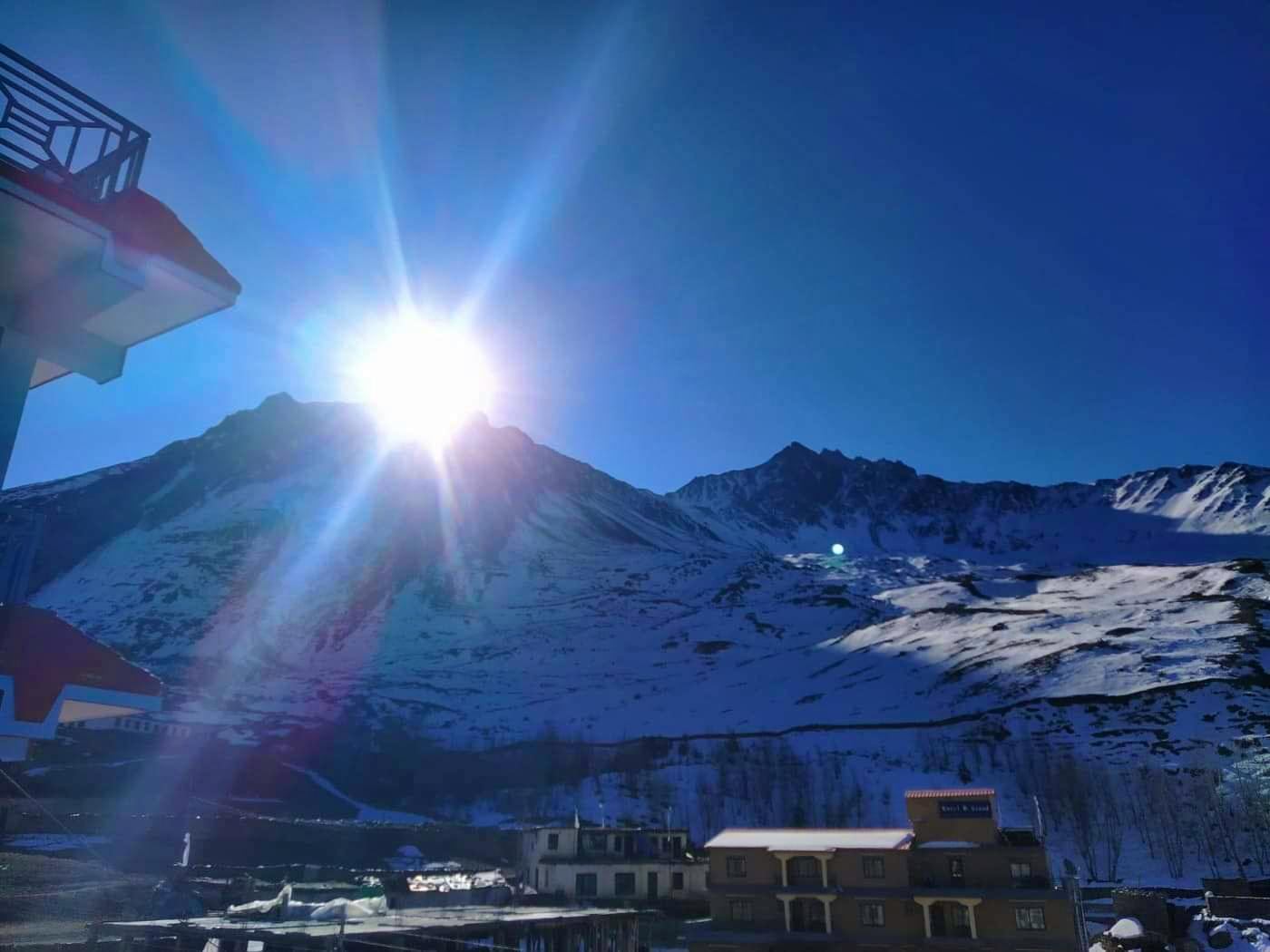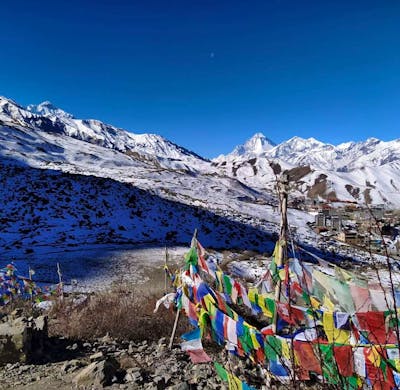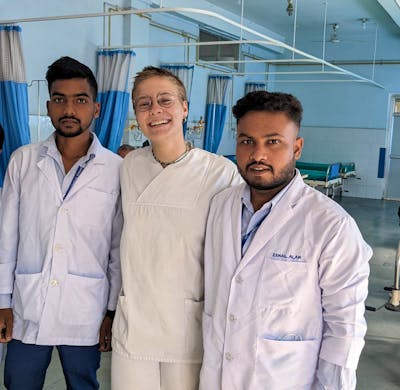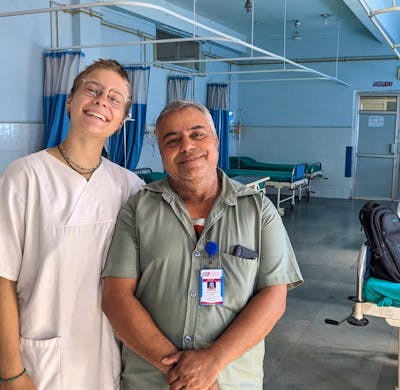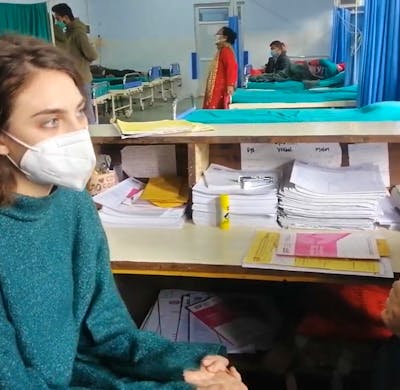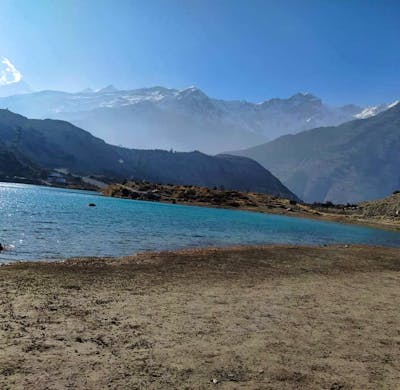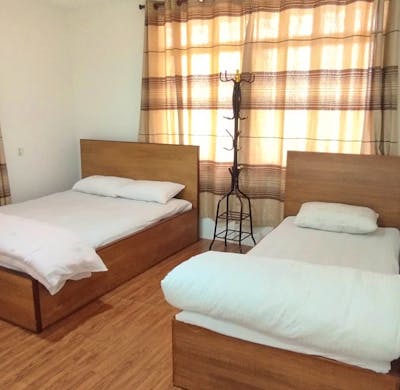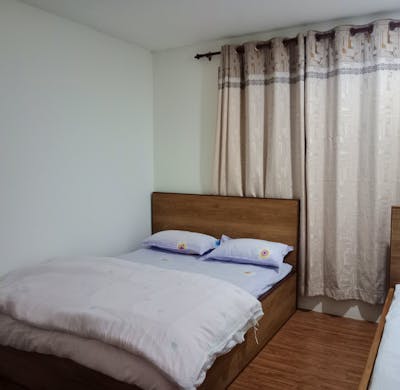As a medical volunteer in Nepal with NVDP, you will have a fantastic opportunity to gain first-hand experience and insight into Nepalese Healthcare. Medical volunteers in Nepal work with highly trained local staff. This gives individuals exposure and tuition that you are unlikely to obtain in your own country. This Medical internship in Nepal is open to al ages and ideal for those with a keen interest in Pursuing a career in Medicine.
What you can expect
As a medical volunteer in Nepal you will have the opportunity to experience a variety of different medical facilities. It's great opportunity to gain some practical experience while working alongside doctors and nurses in Nepal. You will be working in hospital there are a massive scope of work for medical intern in Nepal. Here are some of the task you can expert to do during your placement. Your work will be split in four main areas.
Medical and trekking volunteers in Nepal play a vital role in delivering essential healthcare services while exploring the breathtaking beauty of the country. Motivated by compassion and altruism, these dedicated individuals selflessly devote their time and expertise to enhance the well-being of underserved communities across Nepal. Whether they are medical professionals, nurses, or medical students, their contributions encompass a wide spectrum of medical care, from conducting health screenings and administering vaccinations to providing primary medical treatments and health education. Moreover, medical and trekking volunteers are ready to respond to emergencies and assist in disaster relief efforts during natural calamities. By combining their commitment to healthcare with a spirit of adventure, they embark on treks through Nepal's stunning landscapes, experiencing its cultural richness and diverse traditions. In this unique fusion of medical service and trekking, volunteers bridge the gap in healthcare accessibility while forging unforgettable memories and making a lasting difference in the communities they serve.
Importance of our Program
- Addressing Healthcare Disparities: Nepal, like many developing countries, faces significant healthcare disparities, with rural and marginalized communities often lacking access to basic medical services. Medical volunteers play a crucial role in reaching these underserved populations, providing them with much-needed healthcare and bridging the gap in medical access.
- Improving Health Outcomes: By offering medical care, preventive services, and health education, volunteers contribute to improving overall health outcomes in the communities they serve. Early detection and treatment of illnesses, vaccination campaigns, and health promotion initiatives all work together to enhance the well-being of the local population.
- Disaster Response and Relief: Nepal is prone to natural disasters such as earthquakes, floods, and landslides. In times of crisis, medical volunteers are instrumental in providing immediate medical aid, triage, and support to the affected communities. Their presence helps save lives and facilitates a more effective disaster response.
- Capacity Building: Medical volunteer programs often focus on training and empowering local healthcare professionals and community members. By sharing their knowledge and skills, volunteers contribute to the long-term sustainability of healthcare initiatives in Nepal, strengthening the country's healthcare system.
- Cultural Exchange: The presence of medical volunteers from different parts of the world fosters cultural exchange and understanding. It allows volunteers to gain insights into the local customs and challenges, while also enabling Nepali communities to learn about diverse medical practices and perspectives.
- International Solidarity: Medical volunteer programs demonstrate global solidarity and humanitarian commitment. They showcase the willingness of individuals and organizations worldwide to support those in need and extend a helping hand, promoting a sense of unity and compassion.
- Supporting Local Healthcare Providers: Healthcare facilities in Nepal may be understaffed and overburdened, especially in remote regions. Medical volunteers offer much-needed support to local healthcare providers, allowing them to better serve their patients and provide relief to overworked medical staff.
- Advocacy for Global Health Issues: Medical volunteer programs raise awareness about global health challenges, including the importance of healthcare access, sanitation, nutrition, and disease prevention. This increased awareness can contribute to international efforts to address public health issues on a broader scale.
The Issue
Nepal faces significant medical-related social issues that hinder the well-being of its population, particularly in rural and remote areas. Limited access to healthcare facilities and services leaves many communities underserved, leading to delayed treatment and increased health risks. The scarcity of medical personnel, especially in rural regions, exacerbates the problem, leaving medical facilities understaffed and struggling to provide adequate care. Health education is also lacking in many areas, contributing to misconceptions about health and hygiene practices. The burden of communicable diseases, such as tuberculosis and malaria, persists, alongside the rise of non-communicable diseases like diabetes and cardiovascular issues. Malnutrition among children and maternal health concerns further strain the healthcare system. Moreover, water and sanitation issues and financial constraints for medical treatment pose additional challenges. Bridging these gaps and tackling medical disparities requires a comprehensive approach, including government initiatives, investment in healthcare infrastructure, increased access to education and training for healthcare professionals, and community-based health promotion and awareness programs. Collaboration with international organizations and medical volunteer efforts can also play a crucial role in improving healthcare accessibility and outcomes in Nepal.
Volunteers in the medical field can play a vital role in addressing the healthcare challenges in Nepal. Here are some ways they can contribute to solving the issues:
- Providing Healthcare Services: Medical volunteers can offer their expertise to provide essential healthcare services to underserved communities. They can conduct medical camps, health screenings, and basic medical treatments in remote areas where access to healthcare is limited.
- Health Education and Awareness: Volunteers can organize health education programs to raise awareness about hygiene, nutrition, family planning, and the prevention of common diseases. By empowering communities with knowledge, they can promote healthier lifestyles and better health-seeking behaviors.
- Capacity Building and Training: Collaborating with local healthcare providers, volunteers can offer training sessions to upgrade medical skills and knowledge. This approach helps build the capacity of local healthcare professionals, enabling them to provide more comprehensive and quality care in their communities.
- Maternal and Child Health Initiatives: Medical volunteers can focus on maternal and child health programs, providing prenatal and postnatal care, nutrition counseling, and child immunization drives to reduce maternal and infant mortality rates.
- Addressing Communicable Diseases: Volunteers can contribute to disease prevention efforts by organizing vaccination campaigns, educating communities about preventive measures, and assisting in the treatment and management of communicable diseases.
- Disaster Relief and Emergency Response: In disaster-prone regions, medical volunteers can offer immediate aid and medical assistance during emergencies. Their presence and expertise can make a significant difference in saving lives and providing much-needed relief.
- Collaborating with Local NGOs and Organizations: Medical volunteers can work alongside local non-governmental organizations (NGOs) and healthcare institutions to support ongoing healthcare initiatives and ensure a more sustainable impact.
- Research and Data Collection: Volunteers can assist in collecting health data and conducting research to better understand the health issues prevalent in specific communities. This data can inform evidence-based interventions and health policies.
- Advocacy and Fundraising: Volunteers can engage in advocacy efforts to raise awareness about healthcare disparities in Nepal and the importance of addressing them. They can also help in fundraising activities to support healthcare projects and initiatives.
- Cultural Sensitivity and Community Integration: Volunteers should approach their work with cultural sensitivity, respecting local customs and practices. By integrating with the community and understanding their unique challenges, volunteers can establish stronger connections and more effectively address healthcare issues.
Combining medical volunteering with trekking presents a unique and impactful program that can address both healthcare needs and promote sustainable tourism in Nepal. Here's how this program can work:
Medical Volunteer Activities: Medical volunteers participating in this program can engage in various healthcare initiatives, such as:
- Health Camps in Remote Areas: Trekking routes often pass through remote villages with limited healthcare access. Medical volunteers can set up temporary health camps along these routes to provide medical check-ups, treatment, and health education to local residents. (This Medical health camp should be prepared if there is group of people and additional cost for hiring Local doctors to be paid by volunteers then it will be happened. For the program fees can not be cover hiring local doctors)
- Community Health Workshops: Volunteers can conduct health workshops in trekking destinations, educating travelers and locals about basic first aid, altitude sickness prevention, and other health-related topics. (This Medical health camp should be prepared if there is group of people and additional cost for hiring Local doctors to be paid by volunteers then it will be happened. For the program fees can not be cover hiring local doctors)
- School Health Programs: Collaborating with local schools, medical volunteers can organize health check-ups and hygiene awareness sessions for students, promoting a healthier learning environment.
- Maternal and Child Health Initiatives: Volunteers can focus on maternal and child health, offering prenatal care, child immunizations, and nutrition counseling to improve the well-being of women and children in remote areas.
- Health Screenings and Disease Prevention: Volunteers can conduct screenings for common diseases prevalent in the region, such as tuberculosis and malaria, and provide preventive measures to control their spread.
Trekking and Tourism Aspect: Integrating trekking with the medical volunteering program can have positive impacts on tourism and the local economy:
- Responsible Tourism: The program promotes responsible tourism, encouraging travelers to be conscious of the local community's well-being and support sustainable initiatives.
- Cultural Exchange: Trekking volunteers get the opportunity to immerse themselves in the local culture, understanding the healthcare challenges and cultural aspects of the communities they encounter during their journey.
- Economic Support: The program can contribute to the local economy by engaging local guides, porters, and accommodations, ensuring that the benefits of tourism reach the communities along the trekking routes.
- Environmental Awareness: Volunteers can promote eco-friendly trekking practices, encouraging travelers to minimize their environmental impact and preserve the natural beauty of Nepal.
- Fundraising for Healthcare Projects: The trekking aspect can also serve as a means to raise funds for healthcare projects in Nepal, supporting the sustainability of the medical volunteering initiatives. (This Medical health camp should be prepared if there is group of people and additional cost for hiring Local doctors to be paid by volunteers then it will be happened. For the program fees can not be cover hiring local doctors)
By combining medical volunteering with trekking, this program offers a comprehensive approach to addressing healthcare disparities in remote areas while promoting responsible tourism practices. It allows volunteers to make a meaningful difference in the lives of the local communities they serve while experiencing the beauty and culture of Nepal through trekking.
The Volunteer's Role
The role of a volunteer is essential and multifaceted. Volunteers are individuals who selflessly offer their time, skills, and energy to support various causes, organizations, or communities without expecting financial compensation. Their contributions can have a profound impact and play a crucial role in addressing social, environmental, and humanitarian challenges. Here are some key roles that volunteers fulfill:
- Supporting Nonprofit Organizations: Volunteers are the backbone of many nonprofit organizations. They assist in carrying out the organization's mission and objectives, providing valuable manpower and expertise that might otherwise be unaffordable or unavailable.
- Community Engagement: Volunteers often work directly with communities, understanding their needs, and collaborating to find solutions. They build trust, foster relationships, and empower communities to take charge of their development.
- Providing Services and Skills: Depending on their expertise, volunteers can offer a wide range of services. This includes medical care, teaching, construction, advocacy, counseling, administrative work, and more.
- Advocacy and Awareness: Volunteers play a role in raising awareness about social and environmental issues. They advocate for causes, promote education, and help mobilize resources and support.
- Emergency Response and Relief: During disasters or crises, volunteers provide crucial support by assisting in rescue operations, providing first aid, distributing relief supplies, and helping with recovery efforts.
- Capacity Building: Volunteers can train and mentor individuals and communities, building their skills and knowledge for sustainable development.
- Promoting Sustainable Practices: Volunteers often engage in activities that promote environmental sustainability, such as tree planting, waste management, and conservation efforts.
- Cultural Exchange and Understanding: Volunteers, especially those working internationally, contribute to cultural exchange by immersing themselves in different cultures and understanding diverse perspectives.
- Inspiring Others: Through their actions and dedication, volunteers inspire others to get involved and make a positive impact in their communities.
- Strengthening Social Fabric: Volunteerism fosters a sense of belonging and social cohesion, as people come together for a common cause, transcending differences and working towards a shared goal.
- Bringing Innovation and Creativity: Volunteers often bring fresh perspectives and innovative ideas to address complex problems, spurring creativity and new approaches to challenges.
Your role is purely observational as a medical volunteer in Nepal, so you should not expect any hands-on involvement. Depending on your interests, you will be placed within different departments and you will be attached to an English-speaking member of staff. Please note there may still be a communication barrier and the staff will do their best to translate when they can.
As the role is purely observational, we recommend that applicants sign up for no more than 4 weeks as a medical volunteer in Nepal. In our experience, whilst you will gain invaluable medical insight and knowledge at the private hospital, after a while, most people are eager for some hands-on volunteer work in Nepal. Whilst NVDP cannot offer you hands-on work as a medical volunteer in Nepal, However if you like to have internship in the medical then you can have until 2 weeks to 20 weeks internship program for you.
Volunteers in Nepal have the opportunity to live and work in two diverse and culturally rich locations: Kathmandu and Chitwan.
Kathmandu
Kathmandu, the capital city of Nepal, is a vibrant and bustling metropolis situated in the Kathmandu Valley. As the country's political, economic, and cultural hub, Kathmandu offers a unique experience for volunteers:
- Accommodation: Volunteers typically find accommodation in guesthouses or hostels in various parts of the city as we provide. There are options ranging from budget-friendly to more upscale accommodations, catering to different preferences and needs.
- Cultural Immersion: Kathmandu is home to a rich cultural heritage, with numerous ancient temples, pagodas, and historic sites. Volunteers can explore iconic landmarks like Swayambhunath Stupa (the Monkey Temple), Boudhanath Stupa, and Durbar Square, immersing themselves in Nepal's history and spirituality.
- Social Life: The city has a lively social scene with restaurants, cafes, and markets where volunteers can sample local cuisine, interact with locals, and experience the city's vibrant atmosphere.
- Accessibility: Being the capital, Kathmandu is well-connected with international flights and serves as a convenient gateway for volunteers arriving in Nepal.
Chitwan
Chitwan, located in the southern part of Nepal, is renowned for its stunning natural beauty and wildlife. It is home to Chitwan National Park, a UNESCO World Heritage site and one of the most popular national parks in Nepal:
- Accommodation: Volunteers in Chitwan often stay in lodges or guesthouses within or near the national park as our references. These accommodations provide an immersive experience amidst the lush landscapes and wildlife.
- Wildlife and Nature: Chitwan National Park offers a unique opportunity to encounter diverse wildlife, including Bengal tigers, one-horned rhinoceroses, elephants, and numerous bird species. Volunteers can participate in wildlife monitoring, conservation efforts, and eco-tourism activities.
- Community Engagement: Besides conservation work, volunteers can engage with local communities, learning about their traditional ways of life, culture, and customs. This interaction fosters a deeper understanding of rural Nepal.
- River Adventures: Chitwan is also known for its beautiful rivers. Volunteers can enjoy activities like canoeing, river safaris, and exploring the serene landscapes along the riverside.
- Sustainable Tourism: Chitwan promotes sustainable tourism practices, offering volunteers the opportunity to support eco-friendly initiatives and contribute to conservation efforts.
Institutions
As a medical volunteer in Nepal, there are various medical institutions and hospitals where you can contribute your skills and make a positive impact on healthcare. Some of the institutions and areas where volunteers can work include:
- Government Hospitals: Nepal has several government-run hospitals in urban and rural areas. Volunteers can work in these hospitals, assisting healthcare professionals, conducting health camps, and providing medical care to patients.
- Private Hospitals and Clinics: There are private hospitals and clinics in major cities of Nepal. Medical volunteers can collaborate with these institutions to provide specialized care and support in various medical specialties.
- Community Health Centers: Community health centers are essential for providing basic healthcare services in rural and underserved areas. Volunteers can work in these centers, offering medical check-ups, health education, and preventive care.
- Nonprofit Healthcare Organizations: Numerous nonprofit organizations in Nepal focus on healthcare and public health issues. Volunteers can join these organizations to support their initiatives, which may include maternal and child health, disease prevention, and health promotion.
- Mobile Health Clinics: Some organizations operate mobile health clinics that reach remote communities. Volunteers can be part of these mobile units, bringing healthcare services directly to those who have limited access to medical facilities.
- Specialized Medical Projects: Some organizations run specialized medical projects, such as eye care programs, dental clinics, or disability support initiatives. Volunteers with expertise in these areas can be involved in such projects.
- Disaster Relief Organizations: Nepal is prone to natural disasters. Medical volunteers can join disaster relief organizations to provide emergency medical assistance during times of crisis.
- Women's and Maternal Health Clinics: There are organizations that focus on improving women's health and maternal care. Volunteers can contribute to these initiatives, offering prenatal care, maternal health education, and support for women's health issues.
- Health Research and Data Collection: Volunteers can collaborate with research organizations to collect health data, conduct surveys, and contribute to public health research.
Our Expectations
As an organization or community receiving volunteers, there are certain expectations that we may have from you. These expectations are essential for ensuring a successful and meaningful volunteering experience for both the volunteers and the host organization. Some common expectations include:
- Commitment and Reliability: We expect volunteers to be committed to their volunteering roles and responsibilities, showing up on time and completing the tasks assigned to them. Reliability is crucial for the smooth functioning of projects and activities.
- Professionalism: Volunteers should conduct themselves professionally, respecting the organization's rules, guidelines, and code of conduct. They should maintain appropriate behavior and adhere to ethical standards.
- Respect for Culture and Diversity: Volunteers should show respect for the local culture, customs, and traditions. Embracing diversity and being sensitive to the cultural context is important, especially when working in a different country or community.
- Openness to Learning: We expect volunteers to be open to learning and understanding the local context and the challenges faced by the community. This includes being receptive to new ideas and adapting their approach based on the needs of the community.
- Collaboration and Teamwork: Volunteering often involves working with a team of professionals and local staff. Volunteers should be willing to collaborate and contribute positively to the team's efforts.
- Flexibility and Adaptability: Volunteering experiences can be dynamic and unpredictable. Volunteers should be flexible and adaptable to changes in plans and be willing to step in where their skills are most needed.
- Safety and Well-being: We expect volunteers to prioritize their safety and well-being, adhering to safety guidelines and practices provided by the organization. This includes following health protocols, especially during medical volunteering assignments.
- Honesty and Transparency: Volunteers should be honest about their skills, qualifications, and limitations. It's essential for volunteers to communicate openly with the organization about any concerns or challenges they may face during their volunteering period.
- Accountability: Volunteers should take ownership of their responsibilities and be accountable for their actions and contributions. They should be willing to report their progress and outcomes to the organization.
- Positive Attitude: Lastly, we expect volunteers to approach their volunteering experience with a positive attitude, enthusiasm, and a genuine desire to make a positive impact in the community.
Equipment
The need for special equipment for volunteers largely depends on the type of volunteering work they will be involved in. In the context of medical volunteering, volunteers might need to consider bringing certain specialized equipment or items to ensure they can perform their tasks effectively and safely. Here are some considerations:
Medical Volunteering: If volunteers are engaging in medical work, especially in resource-limited areas, they may need to bring the following:
- Personal Protective Equipment (PPE): Depending on the medical tasks they will perform, volunteers might need to bring their own PPE, such as gloves, masks, gowns, and goggles, to ensure their safety and protect against potential infections.
- Medical Reference Materials: Volunteers may bring medical textbooks, guidelines, or reference materials relevant to their area of expertise to assist in diagnosis and treatment.
The Trekking Experience
Everest Basecamp trek
We would like to tell to the volunteers that we listed the program fees in the website should be volunteering and Everest Basecamp trek!
Everest Base camp trek is quite simply the classic trek in Nepal. High in the priority list of trekkers, the Everest Base Camp is one of the most visited regions in the Himalaya. The two week trek starts and finishes at Lukla, an airstrip to the south of the region also known as the 'Gateway to Everest'. Most trekkers fly to Lukla, to begin the trek.
Starting from Lukla, a gentle two -day trek up the Dudh Koshi valley leads to the famous Namche bazaar. The route has an abundance of tea houses, Phakding and Monjo are the popular stopovers on the first day and just beyond Monjo is the entrance to the Sagarmatha National Park at Jorsale check point where permits are checked. The trail that followed the Dudh Koshi River starts going uphill from the suspension bridge just a few minutes from Jorsale and Namche Bazaar is reached after a 3 hour hike.
It is good to halt here for a few days to acclimatize by walking in the surroundings of Namche as it can't be done in a hurry. A visit to Syangboche or some Sherpa villages such as Thame, Khumjung and Khunde just a few hours walk from Namche are good options for a hike to while away your time.
Leaving Namche Bazaar, the trail follows the valley of Imja Khola with spectacular views of Thamserku, Kangtega and Ama Dablam mountains, while dominating the skyline ahead are the giants, Lhotse and Everest. The most common night halt after Namche is at the top of a steep climb from the Imja khola at Tengboche. The Tengboche Monastery is one of the most famous monasteries, probably because of its unrivalled backdrop, Mt. Ama Dablam.
Following the Imja Khola from Tengboche, the trail ascends through Pangboche until Pheriche or Dingboche is reached, where the day's trek ends. Another day of acclimatization follows with a fascinating side trip to Chhukung which is about a 3 hour walk from Dingboche.
From Dingboche or Pheriche a 6 hour walk leads to Lobuche which sits on the lateral marine of the Khumbu glacier. What follows is a roughly 3 hour hike from Lobuche to the last settlement on the trail known as Gorak Shep. the few tea houses at this place provide shelter for the night before one undertakes the final leg of the trek over the glacier to Everest Base Camp.
Everest Base Camp trekking offers a unique experience with panoramic views of the world's highest and most beautiful mountains. It is one of the most inspiring place in the world and trekking is possible all year round, but the best times to visit are March to May and September to December.
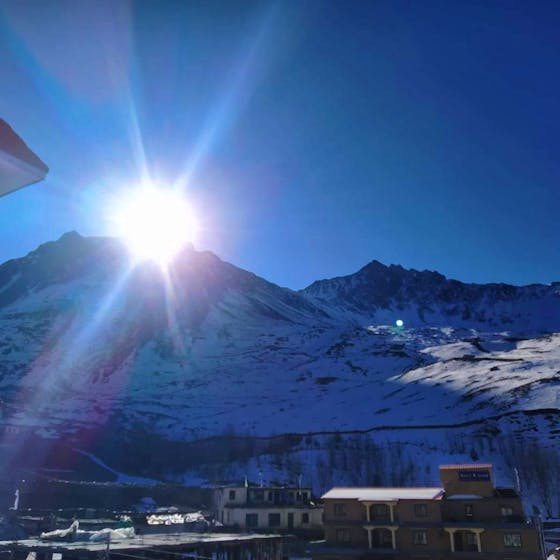
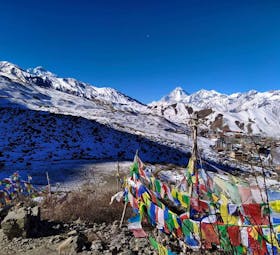
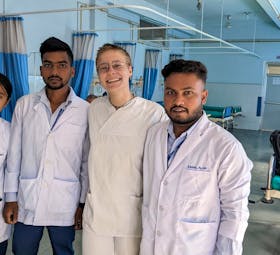
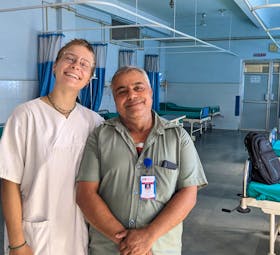
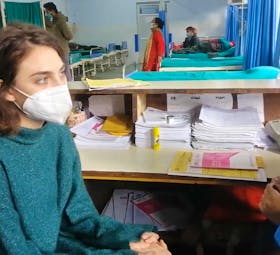
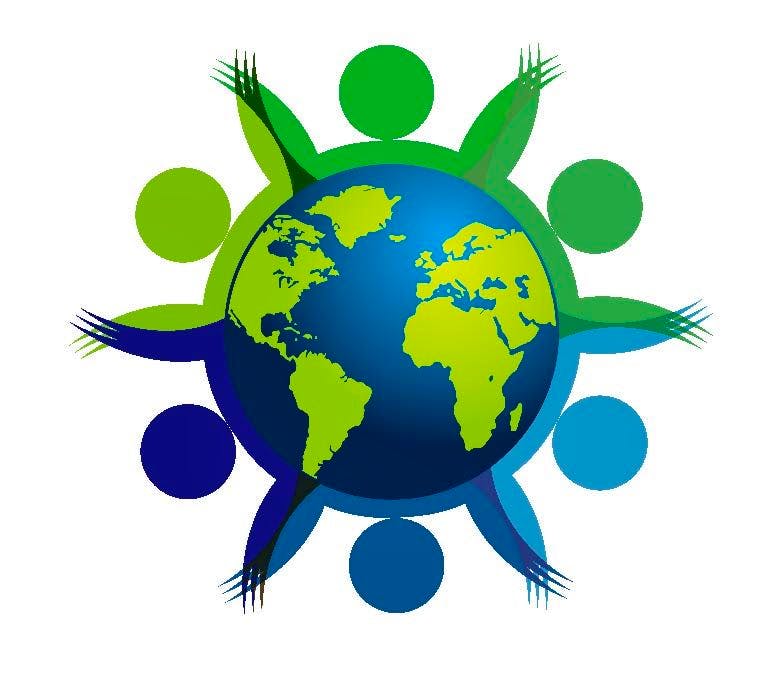
 4.3
4.3

